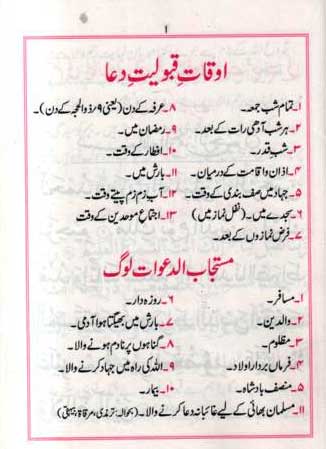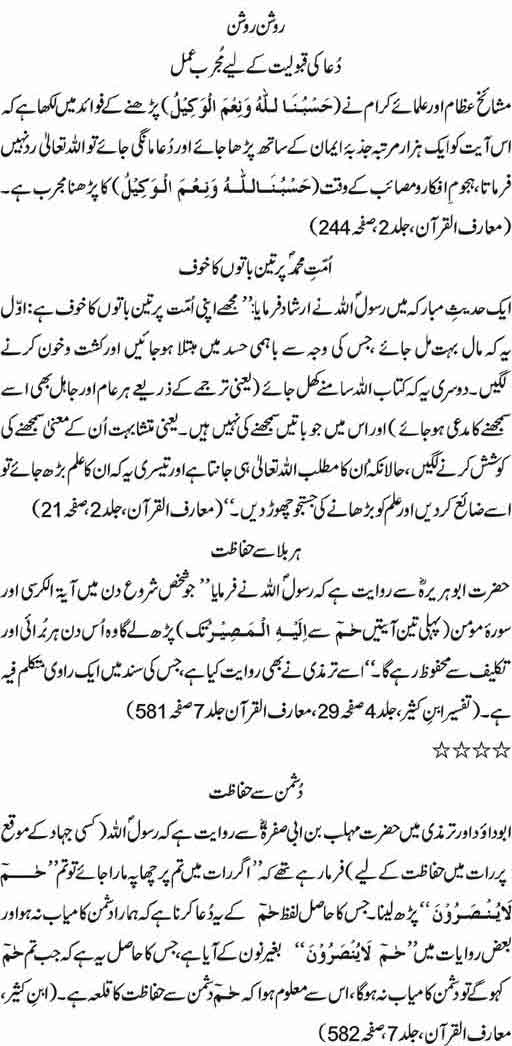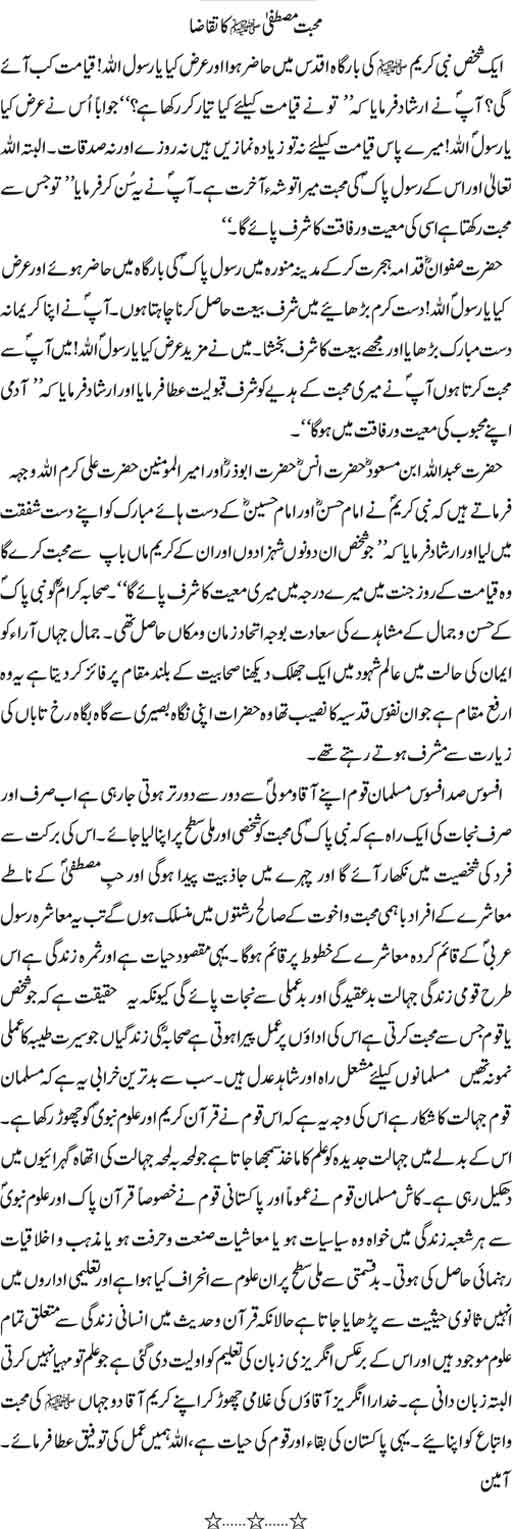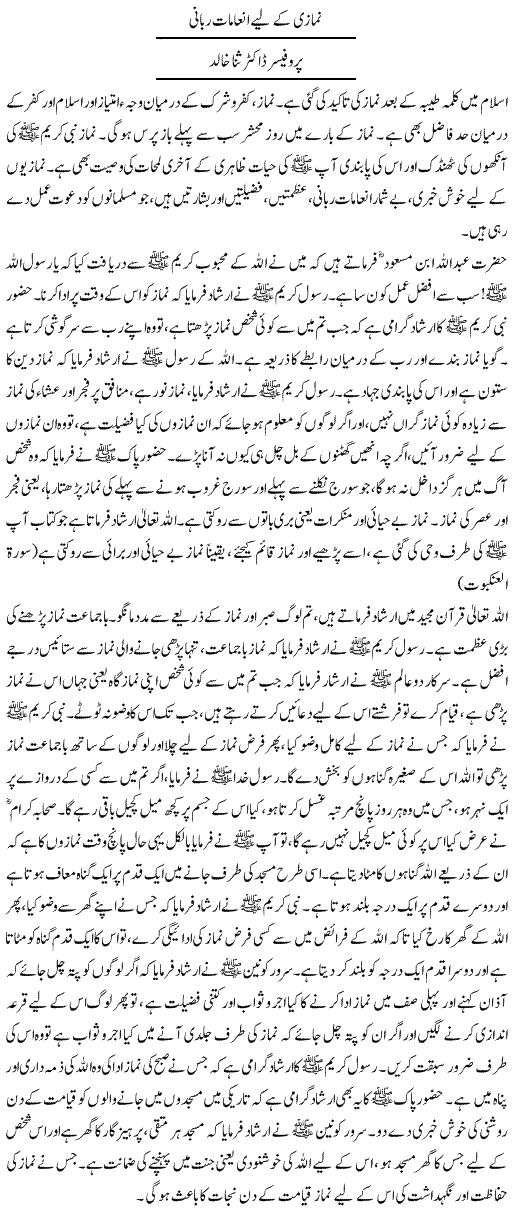





Abu Hurairah (May Allah be pleased with him) reported: The Messenger of Allah (PBUH) put me in charge of charity of Ramadan (Sadaqat-ul-Fitr). Somebody came to me and began to take away some foodstuff. I caught him and said, “I must take you to the Messenger of Allah (PBUH).” He said, “I am a needy man with a large family, and so I have a pressing need.” I let him go. When I saw the Messenger of Allah (PBUH) next morning, he asked me, “O Abu Hurairah! What did your captive do last night?” I said, “O Messenger of Allah! He complained of a pressing need and a big family. I felt pity for him so I let him go.” He (PBUH) said, “He told you a lie and he will return.” I was sure, according to the saying of the Messenger of Allah (PBUH) that he would return. I waited for him. He sneaked up again and began to steal foodstuff from the Sadaqah. I caught him and said; “I must take you to the Messenger of Allah (PBUH).” He said, “Let go of me, I am a needy man. I have to bear the expenses of a big family. I will not come back.” So I took pity on him and let him go. I went at dawn to the Messenger of Allah (PBUH) who asked me, “O Abu Hurairah! What did your captive do last night?” I replied, “O Messenger of Allah! He complained of a pressing want and the burden of a big family. I took pity on him and so I let him go.” He (PBUH) said, “He told you a lie and he will return.” (That man) came again to steal the foodstuff. I arrested him and said, “I must take you to the Messenger of Allah (PBUH), and this is the last of three times. You promised that you would not come again but you did.” He said, “Let go of me, I shall teach you some words with which Allah may benefit you.” I asked, “What are those words?” He replied, “When you go to bed, recite Ayat-ul-Kursi (2:255) for there will be a guardian appointed over you from Allah, and Satan will not be able to approach you till morning.” So I let him go. The next morning the Messenger of Allah (PBUH) asked me, “What did your prisoner do last night.” I answered, “He promised to teach me some words which he claimed will benefit me before Allah. So I let him go.” The Messenger of Allah (PBUH) asked, “What are those words that he taught you?” I said, “He told me: `When you go to bed, recite Ayat-ul-Kursi from the beginning to the end i.e.,
[ Allah! none has the right to be worshiped but He, the Ever Living, the One Who sustains and protects all that exists. Neither slumber nor sleep overtakes Him. To Him belongs whatever is in the heavens and whatever is on the earth. Who is he that can intercede with Him except with His Permission? He knows what happens to them (His creatures) in this world, and what will happen to them in the Hereafter. And they will never compass anything of His Knowledge except that which He wills. His Kursi encompasses the heavens and the earth, and preserving them does not fatigue Him. And He is the Highest, the Most Great].’ (2:255).
He added: `By reciting it, there will be a guardian appointed over you from Allah who will protect you during the night, and Satan will not be able to come near you until morning.” The Messenger of Allah (PBUH) said, “Verily, he has told you the truth though he is a liar. O Abu Hurairah! Do you know with whom you were speaking for the last three nights?” I said, “No.” He (PBUH) said, “He was Shaitan (Satan).” [Al-Bukhari].
Commentary: This Hadith tells us the excellence of Ayat-ul-Kursi and the importance of reciting it before going to bed.

Roshan Roshan Dua Ki Qabooliyat Kay Liye Mujarab Amal
Qiyamah will come when…
Hadhrat Abu Musa Ash’ari (R.A.) narrates that Rasulallah (Sallallahu Alayhi Wassallam) said, “Qiyamah will come…
When it will be regarded as a shame to act on Quranic injunctions.
When untrustworthy people will be regarded as trustworthy and the trustworthy will be regarded as untrustworthy.
When it will be hot in winter.
When the length of days is stretched, i.e. a journey of a few days is covered in a matter of hours.
When orators and lecturers lie openly.
When people dispute petty issues.
When women with children come displeased on account of them bearing offspring, barren women remain happy on account of having no responsibility for offspring.
When oppression, jealousy, and greed become the order of the day.
When people blatantly follow their passions and whims.
When lies prevail over the truth.
When violence, bloodshed, and anarchy become common.
When immorality overtakes shamelessness and is perpetrated publicly.
When legislation matters pertaining to Deen is handed over to the worst elements of the Ummat, and if people accept them and are satisfied with their findings, then such persons will not smell the fragrance of Jannat.
When the offspring become a cause of grief and anger (for their parents).
The following is part of a lengthy Hadith narrated by Hadhrat Abdullah Ibn Mas’ood (R.A.) when he inquired from Rasulallah (Sallallahu Alayhi Wassallam) about the Signs of Qiyamah.
Music and musical instruments will be found in every home.
People will indulge in homosexuality.
There will be an abundance of illegitimate children.
There will be an abundance of critics, tale carriers, back-biters, and taunters in society.
People will establish ties with strangers and sever relations with their near and dear ones.
Hypocrites will be in control of the affairs of the community and evil, immoral people will be at the helm of business establishments.
The Masjid will be decorated, but the hearts of the people will be devoid of guidance.
The courtyards of Masjids will be built beautifully and high mimbars (pulpits) will be erected.
Gangsters and evil people will prevail.
Various wines will be consumed excessively.
Auf bin Malik (R.A.) says: I came to Rasulullah (Sallallahu Alayhi Wasallam) while he was in his skin tent during the Tabuk expedition. He said to me, “Count six things before the advent of Qiyamah:
1 My death
2 The conquest of Jerusalem
3 Mass deaths amongst you people, just as when sheep die in large numbers during an epidemic
4 Abundance of wealth to such an extent that if a person were to be given a hundred Dinars he will still not be satisfied
5 General anarchy and bloodshed, that no Arab household will be spared from it
6 Then a life of peace as a result of a peace agreement between you and the Banil Asfaar
(Romans) which they will break and attack you with a force consisting of eighty flags and under each flag will be an army of twelve thousand men.” (Hadith: Sahih Bukhari).
IRAQ and SYRIA
Abu Nadhrah says: “We were sitting in the company of Jabir bin Abdullah (R.A.) when he said: ‘Soon the people of IRAQ will neither receive any food (grain) nor any money.'” We asked, “Why would such a thing happen?” He replied, “Because of the non-Arabs.” (i.e they will prevent food from going into Iraq, in the form of “sanctions” to this day.) He then said: “Soon the people of Shaam (SYRIA) will neither receive any money nor grain.” We asked why this would happen. He replied: “Because of the Romans (christians).”
CONCEITED PEOPLE:
Hadhrat Abbas (R.A) narrates that Rasulallah (Sallallahu Alayhi Wassallam) has said, “Islam will spread far and wide, across the seas. Horses will cross the land and seas in the cause of Jihaad. Then a time will come wherein a group of people will emerge which recites the Quraan. They will claim,
‘We have recited the Quraan and is there anyone who understands the Quraan better than us? There is NO ONE more proficient than us in the study of the Quraan.’
Then Rasulallah (Sallallahu Alayhi Wassallam) asked the Sahaba, “Do you see any good in their claims?” The Sahaba replied, “No”. Rasulallah (Sallallahu Alayhi Wassallam) said, “But these conceited claimants will be from my Ummah and will be the fuel of the Fire.”
from “Signs of Qiyamah” (excerpts)
by Mohammed Ali Ibn Zubair Ali

Khwaten Aur Hijab
Another Gem from Sahih Muslim
Sahih Muslim Book 37, Number 6623:
Hanzala Usayyidi, who was amongst the scribes of Allah’s Messenger (may peace be upon him). reported: I met Abu Bakr. He said: Who are you? He (Hanzala) said: Hanzala has turned out to be a hypocrite. He (Abu Bakr) said: Hallowed be Allah, what are you saying?
Thereupon he said: I say that when we are in the company of Allah’s Messenger (may peace be upon him) we ponder over Hell-Fire and Paradise as if we are seeing them with our very eyes and when we are away from Allah’s Messenger (may peace be upon him) we attend to our wives, our children, our business; most of these things (pertaining to After-life) slip out of our minds.
Abu Bakr said: By Allah, I also experience the same. So I and Abu Bakr went to Allah’s Messenger (may peace be upon him) and said to him: Allah’s Messenger, Hanzala has turned into a hypocrite. Thereupon Allah’s Messenger (may peace be upon him) said: What has happened to you?
I said: Allah’s Messenger, when we are in your company, we are reminded of Hell-Fire and Paradise as if we are seeing them with our own eyes, but whenever we go away from you and attend to our wives, children, and business, much of these things go out of our minds.
Thereupon Allah’s Messenger (may peace be upon him) said: By Him in Whose Hand is my life, if your state of mind remains the same as it is in my presence and you are always busy in remembrance (of Allah), the Angels will shake hands with you in your beds and in your paths but, Hanzala, time should be devoted (to the worldly affairs) and time (should be devoted to prayer and meditation). He (the Holy Prophet) said this thrice.
Here are a few things to be noted from this wonderful Hadith from Sahih Muslim
1) When the companions of the Holy Prophet Muhammed Sallalaahu Alahi wasallam were there in his presence they could ponder over heaven and hell as if it were right in front of their eyes, but when they left his company to go for business, or attend their family affairs the effect would go away, nearness to the Holy Prophet Muhammed Sallalaahu Alahi wasallam has such a big effect on a Muslim, the same also pertains to other servants of Allah who are lesser in status like the Awliya , who derived their spiritual guidance through the nearness to the Holy Prophet Muhammed Sallalaahu Alahi wasallam, nearness to them and visiting them has a huge effect on Imaan.
2) All acts which bring you closer to him and help you maintain a Qalbi roohani attachment to him also bring benefit
3) One must not always be engrossed in worship and should also attain to his work and family affairs.
Tanveer Pasha

Muhabat-e-Mustafa Kay Taqazeey
1.”As-Salaamu Alaikum” is a means of immense reward
A man passed by the Messenger of Allaah (Sal Allaahu Alaihi wa Sallam) while he was sitting with others, and said “As-salaamu ‘alaykum.”
The Prophet (Sal Allaahu Alaihi wa Sallam) said, “[He will have] ten hasanaat.”
Another man passed by and said “As-Salaamu Alaikum wa Rahmatullaah (peace be upon you and the mercy of Allaah).”
The Prophet (Sal Allaahu Alaihi wa Sallam) said, “[He will have] twenty hasanaat.”
Another man passed by and said “As-Salaamu Alaikum wa Rahmatullaahi wa Barakaatuh (peace be upon you and the mercy of Allaah and His blessings).”
The Prophet (Sal Allaahu Alaihi wa Sallam) said, “[He will have] thirty hasanaat.”
2.”As-Salaamu Alaikum” is an aspect of Imaan
Once a man asked the Prophet (Sal Allaahu Alaihi wa Sallam) about which aspect of Islam was best. The Prophet (Sal Allaahu Alaihi wa Sallam) replied: “Feeding the hungry, and saying salaam to those you know and those you don’t know.” (Bukhaari and Muslim)
3. “As-Salaamu Alaikum” is a means of entering Jannah
The Prophet (Sal Allaahu Alaihi wa Sallam) said: “You will not enter Paradise until you believe, and you will not believe until you love one another. Shall I not tell you about something which, if you do it, you will love one another? Spread salaam (the greeting of peace) among you.” (Muslim)
4. “As-Salaamu Alaikum” gets rid of sins
The Prophet (Sal Allaahu Alaihi wa Sallam) also said, “When two Muslims meet (give salaam), and shake hands, they are forgiven their sins before they part (with each other).” (Abu Dawud)
5. “As-Salaamu Alaikum” is the greeting of the people of Jannah
“Then, those that feared their Lord shall be driven in companies into Paradise. When they draw near its gates will be opened, and its keepers will say to them: “Salaamun ‘Alaikum” (Peace be upon you), you have done well. Enter and live in it forever.” (Surah Zumar:73)

Namazi Ke Liye Inamat e Rabbani
When young Muslims meet others for the first time and find out that they are Muslim, often one of the very first questions they ask each other is, “Do you pray?” It’s as if this is their touchstone to see if the person they have met is a real Muslim or not. Calling yourself Muslim is one thing, being a Muslim is something else.
Praying five times a day is at the heart of Islam. It is one of the things that distinguishes a Muslim from everyone else in the world; that all the activities of life can be made significant by the cycle of prayer and praise which we offer to Almighty Allah. So why, then, do we have such a problem being faithful to prayer?
My first Umrah was one of the most important experiences of my life and it had its effects on me. Being so close to the Kaaba was a deeply moving experience. Being at the very place where our beloved Prophet (peace be upon him), like all the prophets before him, had walked and prayed, was amazing.
One of the things that hit me most about being in Makkah, among so many others, was when the call to prayer sounded for Fajr, the Dawn prayer. Thousands of people appeared from every direction and headed toward the Kaaba for prayer.
Getting up in the middle of the night wasn’t difficult at all, because the experience of praying at the Kaaba was so moving. At the time, moving with the vast crowd, I couldn’t help thinking about what it is usually like back home.
Those getting up and going to the mosque for the dawn prayer are certainly a minority, aren’t they? Away from Makkah, it is all too easy to ignore the Adhan completely and stay in the comfort of one’s bed.
At special times like Ramadan, or when we go on pilgrimage, it seems so much easier to be faithful to prayer and to take Islam so much more seriously. How many of us, for example, attended Tarawih Prayers in the mosque during Ramadan, even though we might occasionally miss one or two of the obligatory prayers?
It’s one of life’s paradoxes that we want so much to be good, and yet we find ourselves falling into the same old traps and doing things we later regret. How odd we are as human beings! We can quite happily sit in front of the television for hours or sit idly chatting on the Internet to no one in particular, yet we can’t manage to set aside 10 minutes to pray.
